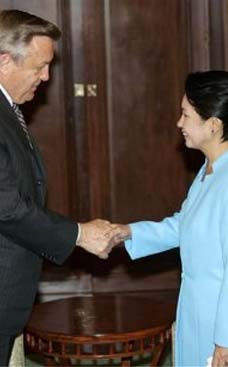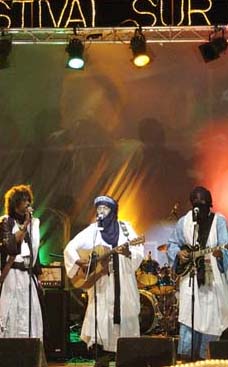2007.05.21: May 21, 2007: Headlines: COS - Nepal: Secondary Education: Awards: Williams College: Nepal RPCV Roger Maynard, Jr. awarded George Olmsted, Jr., Class of 1924, Prize for Excellence in Secondary School Teaching
Peace Corps Online:
Directory:
Nepal:
Peace Corps Nepal :
Peace Corps Nepal: New Stories:
2007.05.21: May 21, 2007: Headlines: COS - Nepal: Secondary Education: Awards: Williams College: Nepal RPCV Roger Maynard, Jr. awarded George Olmsted, Jr., Class of 1924, Prize for Excellence in Secondary School Teaching
Nepal RPCV Roger Maynard, Jr. awarded George Olmsted, Jr., Class of 1924, Prize for Excellence in Secondary School Teaching

For 32 years, Maynard has taught at Hartford High, "all, while squeezing in lessons about life, love, and, to be quite honest, the pursuit of happiness. While clearly a person who values education and academic accomplishment," Foote says, "Maynard often emphasizes that he'd rather see his students earn Cs and be good people than score a 4.0 but not contribute as citizens and human beings." After graduating from Williams in 1968, Maynard joined the Peace Corps and spent two years in Nepal. He then taught in a public school in the South Bronx before moving to Vermont to teach social studies at Hartford High, a regional school for several towns.
Nepal RPCV Roger Maynard, Jr. awarded George Olmsted, Jr., Class of 1924, Prize for Excellence in Secondary School Teaching
Four U.S. Secondary School Teachers Recognized as Extraordinary by Williams College Seniors
WILLIAMSTOWN, Mass., May 21, 2007 - Williams College will award its national George Olmsted, Jr., Class of 1924, Prize for Excellence in Secondary School Teaching to Diana M. Canterbury, teacher of theater arts at Worcester (Mass.) Academy; Roger Maynard, Jr., teacher of history and psychology at Hartford High School in White River Junction, Vt.; Kathryn Chang, now a teacher of chemistry at Saratoga (Calif.) High School; and Tracy Suggs, teacher of chemistry at Vestal (N.Y.) Senior High School.
Each year, Williams seniors nominate for the Olmsteds high school teachers who were influential in their lives and a committee of faculty, staff, and students select winners from among the nominees.
In 2005, the Olmsted Prizes received national attention when Thomas L. Friedman, op-ed columnist for The New York Times, highlighted the program and the prize recipients in his column, "Behind Every Grad �".
"The best way to ensure that we have teachers who inspire their students is if we recognize and reward those who clearly have done so," he wrote.
The awards consist of $3,000 for each teacher and $2,500 for his or her school. Winners are honored during Commencement at Williams. The Olmsted Prize, established in 1983, is funded by an endowment from the estates of George Olmsted, Jr., '24, and his wife, Frances, who wished to recognize excellence in secondary school teaching. Olmsted, a lifelong proponent of superior teaching, was the president and chairman of the board of the S. D. Warren Paper Co.
[Excerpt]
Roger Maynard, Jr., Hartford High School, White River Junction, Vt.
Roger Maynard, Jr. "is able to connect with all types of students, regardless of their academic prowess, aspirations, or backgrounds. A play one night, a basketball game the next� Mr. Maynard is there." Williams senior Hannah Foote describes him as a person who "makes students feel valuable for their existence and not for their deeds."
For 32 years, Maynard has taught at Hartford High, "all, while squeezing in lessons about life, love, and, to be quite honest, the pursuit of happiness. While clearly a person who values education and academic accomplishment," Foote says, "Maynard often emphasizes that he'd rather see his students earn Cs and be good people than score a 4.0 but not contribute as citizens and human beings."
After graduating from Williams in 1968, Maynard joined the Peace Corps and spent two years in Nepal. He then taught in a public school in the South Bronx before moving to Vermont to teach social studies at Hartford High, a regional school for several towns.
Maynard's greatest joy comes from the classroom. "I simply love to teach," he says. "With 26 students with a wide variety of learning styles, vastly different motivation levels, often acute emotional needs, teaching is quite a challenge�I like to think that I am like Mark Hopkins on one end of the log, and that I am able to engage that other student on the other end."
Maynard recognizes the need for building relationships that can encourage students to achieve. "Some of my students are great athletes, but not motivated students," he says. "By attending their athletic events, I show them that I value the work they are putting into this part of their lives, and that likewise they should be putting the same effort into their class work."
Links to Related Topics (Tags):
Headlines: May, 2007; Peace Corps Nepal; Directory of Nepal RPCVs; Messages and Announcements for Nepal RPCVs; Secondary Education; Awards; Vermont; Peace Corps Bibliography; Peace Corps Countries of Service; Peace Corps History; Bulletin Board; Recent Peace Corps News
When this story was posted in June 2007, this was on the front page of PCOL:





Peace Corps Online The Independent News Forum serving Returned Peace Corps Volunteers
 | Public diplomacy rests on sound public policy
When President Kennedy spoke of "a long twilight struggle," and challenged the country to "ask not," he signaled that the Cold War was the challenge and framework defining US foreign policy. The current challenge is not a struggle against a totalitarian foe. It is not a battle against an enemy called "Islamofascism." From these false assumptions flow false choices, including the false choice between law enforcement and war. Instead, law enforcement and military force both must be essential instruments, along with diplomacy, including public diplomacy. But public diplomacy rests on policy, and to begin with, the policy must be sound. Read more. |
 | Peace Corps Funnies
A PCV writing home? Our editor hard at work? Take a look at our Peace Corps Funnies and Peace Corps Cartoons and see why Peace Corps Volunteers say that sometimes a touch of levity can be one of the best ways of dealing with frustrations in the field. Read what RPCVs say about the lighter side of life in the Peace Corps and see why irreverent observations can often contain more than a grain of truth. We'll supply the photos. You supply the captions. |
 | PCOL serves half million
PCOL's readership for April exceeded 525,000 visitors - a 50% increase over last year. This year also saw the advent of a new web site: Peace Corps News that together with the Peace Corps Library and History of the Peace Corps serve 17,000 RPCVs, Staff, and Friends of the Peace Corps every day. Thanks for making PCOL your source of news for the Peace Corps community. Read more. |
 | Suspect confesses in murder of PCV
Search parties in the Philippines discovered the body of Peace Corps Volunteer Julia Campbell near Barangay Batad, Banaue town on April 17. Director Tschetter expressed his sorrow at learning the news. “Julia was a proud member of the Peace Corps family, and she contributed greatly to the lives of Filipino citizens in Donsol, Sorsogon, where she served,” he said. Latest: Suspect Juan Duntugan admits to killing Campbell. Leave your thoughts and condolences . |
 | Warren Wiggins: Architect of the Peace Corps
Warren Wiggins, who died at 84 on April 13, became one of the architects of the Peace Corps in 1961 when his paper, "A Towering Task," landed in the lap of Sargent Shriver, just as Shriver was trying to figure out how to turn the Peace Corps into a working federal department. Shriver was electrified by the treatise, which urged the agency to act boldly. Read Mr. Wiggins' obituary and biography, take an opportunity to read the original document that shaped the Peace Corps' mission, and read John Coyne's special issue commemorating "A Towering Task." |
 | Chris Dodd's Vision for the Peace Corps
Senator Chris Dodd (RPCV Dominican Republic) spoke at the ceremony for this year's Shriver Award and elaborated on issues he raised at Ron Tschetter's hearings. Dodd plans to introduce legislation that may include: setting aside a portion of Peace Corps' budget as seed money for demonstration projects and third goal activities (after adjusting the annual budget upward to accommodate the added expense), more volunteer input into Peace Corps operations, removing medical, healthcare and tax impediments that discourage older volunteers, providing more transparency in the medical screening and appeals process, a more comprehensive health safety net for recently-returned volunteers, and authorizing volunteers to accept, under certain circumstances, private donations to support their development projects. He plans to circulate draft legislation for review to members of the Peace Corps community and welcomes RPCV comments. |
 | He served with honor
One year ago, Staff Sgt. Robert J. Paul (RPCV Kenya) carried on an ongoing dialog on this website on the military and the peace corps and his role as a member of a Civil Affairs Team in Iraq and Afghanistan. We have just received a report that Sargeant Paul has been killed by a car bomb in Kabul. Words cannot express our feeling of loss for this tremendous injury to the entire RPCV community. Most of us didn't know him personally but we knew him from his words. Our thoughts go out to his family and friends. He was one of ours and he served with honor. |
 | Peace Corps' Screening and Medical Clearance
The purpose of Peace Corps' screening and medical clearance process is to ensure safe accommodation for applicants and minimize undue risk exposure for volunteers to allow PCVS to complete their service without compromising their entry health status. To further these goals, PCOL has obtained a copy of the Peace Corps Screening Guidelines Manual through the Freedom of Information Act (FOIA) and has posted it in the "Peace Corps Library." Applicants and Medical Professionals (especially those who have already served as volunteers) are urged to review the guidelines and leave their comments and suggestions. Then read the story of one RPCV's journey through medical screening and his suggestions for changes to the process. |
 | History of the Peace Corps
PCOL is proud to announce that Phase One of the "History of the Peace Corps" is now available online. This installment includes over 5,000 pages of primary source documents from the archives of the Peace Corps including every issue of "Peace Corps News," "Peace Corps Times," "Peace Corps Volunteer," "Action Update," and every annual report of the Peace Corps to Congress since 1961. "Ask Not" is an ongoing project. Read how you can help. |
Read the stories and leave your comments.

Some postings on Peace Corps Online are provided to the individual members of this group without permission of the copyright owner for the non-profit purposes of criticism, comment, education, scholarship, and research under the "Fair Use" provisions of U.S. Government copyright laws and they may not be distributed further without permission of the copyright owner. Peace Corps Online does not vouch for the accuracy of the content of the postings, which is the sole responsibility of the copyright holder.
Story Source: Williams College
This story has been posted in the following forums: : Headlines; COS - Nepal; Secondary Education; Awards
PCOL37813
54
|
By Thelma B. Bitayo (119.92.106.250) on Monday, November 16, 2009 - 5:29 pm: Edit Post |
Dear Sir/Madam
I am Thelma B. Bitayo,56 age, a good citizen of Philippines very much interested to apply in teaching position in your place.I am an experienced teacher in our country,if ever given an opurtunity to enternalized teaching in other country and people I love it, just 6 months or a year only.





















